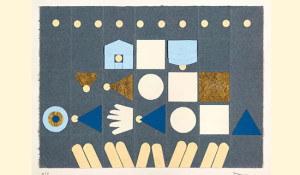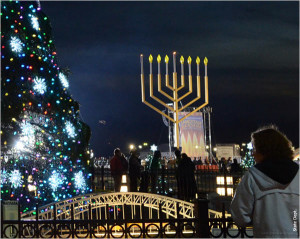Nava Tehilah’s beautiful Oseh Shalom.
May we all find perfect peace this Shabbat and someday always.
Nava Tehilah’s beautiful Oseh Shalom.
May we all find perfect peace this Shabbat and someday always.
As we enter Shabbat, I wanted to share this beautiful soulful rendition of Hashkiveinu, the prayer of our evening service asking for Divine protection and peace.
Shabbat Shalom

As the year 2015 draws to a close, my wish to you:
May the Eternal One bless you and keep you
May the Divine’s face shine upon you and be gracious to you
May you encounter the Divine Presence all along your way and may it bring you peace and wholeness.
A wonderful upbeat tune from Six13 to welcome Shabbat.
Wishing all a Shabbat of Peace and rest~
 Historically, Jews have been actively influenced by the cultures in which we have lived. We learn and borrow from the cultures we live along side. Often our holidays are influenced by these civilizations. Today in the United States we also have the opportunity to take part in national celebrations as full-fledged Americans. How do we, as modern American Jews, engage in rituals that bind Americans together? How do we participate without risking our identity? We have done it with Thanksgiving, but can we do it with Christmas?
Historically, Jews have been actively influenced by the cultures in which we have lived. We learn and borrow from the cultures we live along side. Often our holidays are influenced by these civilizations. Today in the United States we also have the opportunity to take part in national celebrations as full-fledged Americans. How do we, as modern American Jews, engage in rituals that bind Americans together? How do we participate without risking our identity? We have done it with Thanksgiving, but can we do it with Christmas?
There are now effectively two Christmases in the United States. There is Traditional Christmas and there is American Christmas. Traditional Christmas is the religious celebration of the birth of Christ. It is an event with deep meaning for those of the Christian faith. The themes of Divine Love, Peace on Earth and Goodwill are universal values at the core of this deeply religious and holy holiday.
Traditional Christmas is properly the purview of Christians. We cannot presume to enter that space, only respectfully watch from the outside. However, secular American Christmas has become a quintessentially American holiday. It has been reframed and modified into an earthly and commercial season that traditionally started with Santa arriving in front of Macy’s during the Macy’s Thanksgiving Day Parade and continuing with other markers including the major retail events known as Black Friday and Cyber Monday.
American Christmas is a secular event that builds on the values of Traditional Christmas but has been reimagined through a secular and highly commercialized lens. Stripped of its religious elements, American Christmas embraces the joy and other positive emotions of the holiday. Christmas Trees, festive lights and decorations, Rockefeller Center, the windows of Lord & Taylor, Rudolf, Santa Claus, Burl Ives, Irving Berlin, Christmas Songs of all kinds. The list goes on and on.
American Christmas is a time for good cheer, holiday parties, gift giving, family gathering, tree decorating. It has greatly influenced and elevated our celebration of Chanukah. A message of goodwill towards all, peace and love still underlies the season. The promotion of these universal values is something we might actively embrace. Interestingly, we already do it from the other side.
Chanukah has become one of the most popular celebrated Jewish holidays. This is in response to the overwhelming presence of Christmas but also because we have actively promoted Chanukah as part of the American landscape. There is hardly a public square that does not contain a large menorah. Chabad is ubiquitous, lighting the Chanukiah across America from the Washington Mall to the Suburban Square Shopping Center on the Main Line in Philadelphia. Dreidels and Latkes have become part of the American consciousness. Chanukah is promoted as a proclamation of Judaism as a public good, espousing universal values for all to embrace. As we have given the gift of Chanukah to America, can we accept the gift of American Christmas?
We claim to be a nation that shuns the boundaries that separate us. Our millennial generation has embraced that message. And they have an important point, for we can maintain our identity while sharing with others. Opportunities to bring us together as a human family are too few and deeply needed. We often find ourselves separated from others by fears and prejudices that could and should be set aside. Sharing the universal messages of American Christmas with our fellow citizens might be an opportunity to build bridges that deepen our relationships. For our sake let’s celebrate and embrace the holiday season.
Happy Holidays, Chag Sameach and Merry Christmas!
A beautiful rendition of Lecha Dodi to the tune of Leonard Cohen’s Halleluyah sung by the incomparable Maccabeats.
Shabbat Shalom
The situation in Israel seems to be deteriorating. Violence continues to escalate with the knife as a weapon of choice and fear is spreading as attacks come from seemingly out of nowhere. The natural and proper inclination is for law enforcement to become even more vigilant in order to prevent attacks and not only respond. But the police however must be judicious in how they protect the citizens of Israel.
Israel is a nation of laws. She prides herself on having a legal system similar to the American ideal founded on the principle of Equal Protection under the law. Now this system is being severely tested and Israel’s heart and soul are at risk. If Israel permits the profiling of people and the preemptive assault on individuals outside the prescribed due process of the legal system, then she loses and the terrorists win. Israel cannot be democratic if she limits the application of law to select privileged classes, such as Jews, while others, such as Arabs, fall outside that sphere. A crack down on terrorism cannot come at the price of the foundational principles of Israel. A restoration of calm is necessary. The violence and barbaric nature of these attacks on civilians (police included) are certainly not random acts. Israel must carefully consider how to properly respond.
Is this a mass response to “occupation” or are these individual actors perpetrating crimes as copycats? It certainly seems to not be the latter. Even if not expressly ordered by a central control, the attacks are coordinated. The first order is to restore calm. The second order is to cool the boiling over of the cauldron. Repression of an entire group, such as the Arabs of East Jerusalem, and sealing off of that portion of the city, will provide a temporary subduing of these attacks. A closer and deeper look at the grievances that encourage this violence as a legitimate response is required. Then deliberate steps must be taken to create a society that is fair and just.
I do not condone or legitimize the violence. Those that have perpetrated these attacks should be duly punished for breaking the laws of the State and of civilized society. Now it is up to the State and civilized society to solve the problems that have contributed to fomenting such deep discontent with a system of justice that speaks to everyone.

Ushpizin and the Pope
The Jewish mystic tradition, through the Zohar, speaks of the Ushpizin, the greats of Jewish history as welcome guests to our Sukkah.
Abraham, Isaac, Jacob, Joseph, Moses, Aaron and David, along with Sarah, Rachel, Rebecca, Leah, Miriam, Abigail and Esther are our honored visitors. They bring with them the ideals and values central to Judaism and are sacred honored guests at our table, if only metaphorically.
Here in Philadelphia we had the opportunity to add another name to the honored guests. This one is Pope Francis. His Holiness speaks of values that we hold sacred. He speaks truth to power, even when that truth is uncomfortable. He illumines a path of joy and happiness, purpose and service, a meaningful life that extends beyond ourselves, in service to others. He is the Pope of the Catholics, but he is also a Pope for the World. Pope Francis has stretched out his arms to embrace Jews as brothers and sisters. He does this through his long-standing friendship and collaboration with Rabbi Skorka of Argentina. He also reaches out to the Jewish people through his support of Israel and his blessing of “Sinagoga and Ecclesia, In our Time,” a magnificent statue dedicated to the profound understanding of brotherhood between our two religious traditions commemorated on the fiftieth anniversary of Nostra Aetate.
We are blessed to have Pope Francis in our midst. May his vision and teachings empower all of us to work to build a better world together.